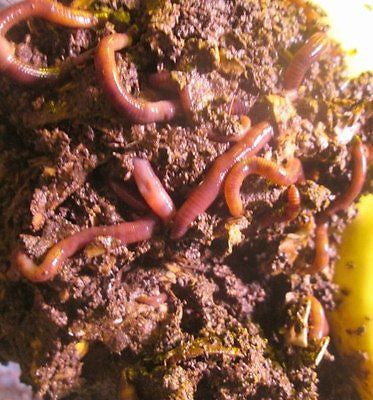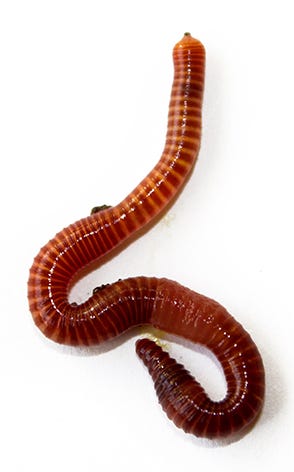Organic red wigglers: Perfect for small compost setups
Organic red wigglers: Perfect for small compost setups
Blog Article
Why Red Wigglers Are Crucial for Organic Farming
Red wigglers play a crucial duty in natural farming, mostly with their distinct ability to break down natural products and enhance soil health and wellness. The degree of their influence on farming practices and soil biology increases interesting questions regarding the future of organic farming.
Role of Red Wigglers in Dirt Wellness

Furthermore, red wigglers improve dirt structure by developing channels as they burrow. These networks improve oygenation and water infiltration, advertising a much healthier root environment. Their task additionally assists in maintaining optimal dampness degrees, which is vital for healthy plant growth.

Benefits of Worm Spreadings
Worm castings, the nutrient-rich waste matter created by red wigglers, serve as an effective change for natural farming. These spreadings are brimming with crucial nutrients such as nitrogen, phosphorus, and potassium, which are essential for plant growth. Unlike synthetic plant foods, worm spreadings release nutrients slowly, giving a constant supply gradually and decreasing the threat of nutrient leaching and runoff.
In addition, worm castings improve dirt framework and oygenation, advertising much healthier root systems. Their high raw material material enhances moisture retention, enabling plants to better stand up to dry spell problems. Additionally, worm castings have helpful microorganisms that sustain plant wellness by suppressing microorganisms and enhancing vitamins and mineral uptake.
The application of worm castings can cause boosted crop returns and improved top quality of produce, making them an important source for natural farmers. Their usage likewise lines up with lasting farming red wiggler farming techniques, adding to dirt fertility without the negative environmental impacts related to chemical plant foods. In general, the incorporation of worm castings into agricultural techniques cultivates an extra resistant and efficient ecosystem, underscoring the value of red wigglers in natural farming systems.

Enhancing Nutrient Cycling
(red wigglers)Nutrient cycling is an essential procedure in organic farming, and the integration of red wigglers plays an essential duty in improving this cycle. As red wigglers consume rotting organic issue, they eliminate nutrient-rich castings, which are brimming with helpful microbes.
Moreover, red wigglers assist to increase the mineralization of nutrients, transforming them from inert types right into bioavailable types that plants can soak up. This process is crucial for maintaining soil fertility and advertising healthy plant development. The presence of red wigglers additionally urges a diverse soil ecological community, fostering a balance of nutrients that supports different plant types.
Improving Dirt Framework
The improvement of soil framework is vital for cultivating a healthy agricultural ecological community, and the task of red wigglers substantially adds to this improvement. These earthworms play an important role in aerating the soil and creating a network of channels that help with water seepage and origin infiltration. As they tunnel via the dirt, red wigglers separate compacted layers, permitting much better oxygen exchange and promoting microbial activity.
Additionally, the raw material produced from their waste, understood as vermicast, enhances dirt gathering. This process develops steady globs of dirt fragments, boosting dirt porosity and minimizing erosion (red wigglers). The existence of red wigglers likewise encourages the advancement of valuable fungal networks, which are critical for nutrient uptake by plants
Encouraging Sustainable Practices
Incorporating red wigglers into organic farming methods not only enhances soil wellness yet likewise promotes lasting farming approaches. These earthworms play a vital duty in nutrient biking, transforming natural waste right into useful garden compost that enriches the dirt. By utilizing red wigglers, farmers can successfully lower dependence on synthetic plant foods, thus reducing chemical drainage and its detrimental impacts on ecological communities.
In addition, the unification of red wigglers encourages the technique of recycling natural materials, such as kitchen area scraps and ranch waste. This waste decrease method not only decreases disposal costs yet likewise promotes a closed-loop system where nutrients are continually gone back to the soil (red wigglers). Such methods are important in reducing environment change, as they boost carbon sequestration and minimize greenhouse gas discharges
Furthermore, red wigglers enhance water retention in the dirt, which is important in times of dry spell. Their burrowing activities produce networks that allow water to pass through much deeper right into the ground, thus advertising efficient water use. Inevitably, integrating red wigglers right into organic farming not only supports biodiversity but likewise straightens with the principles of sustainable agriculture, supplying an alternative technique to food manufacturing.
Conclusion
In final thought, red wigglers play an essential function in natural farming by considerably enhancing soil health and fertility. Their capacity to decay raw material and create nutrient-rich spreadings fosters a successful microbial area, which is important for nutrition cycling. Additionally, the tunneling activities of these worms boost soil framework and aeration, assisting in much better water infiltration and root growth. Hence, the assimilation of red wigglers right into farming techniques is essential for advertising sustainability and boosting total dirt quality.
Report this page